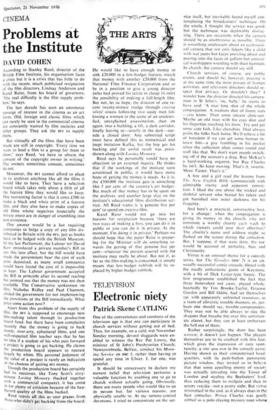CINEMA
Problems at the Institute
DAVID COHEN
According to Stanley Reed, director of the British Film Institute, his organisation faces a crisis but it is a crisis that has little to do with the recent, much publicised resignation of the film directors, Lindsay Anderson and Karel Reisz, from his board of governors. The real difficulty is the film supply prob- lem,' he says.
The last decade has seen an enormous upsurge of interest in the cinema as an art form. Old, foreign and classic films which can rarely be seen in the commercial cinema are constantly wanted by film societies and other groups. They ask the BFI to supply them.
But virtually all the films that have been made are still in copyright. 'Every time we want to lend a film to a group for them to show,' says Reed, 'we have to obtain the consent of the copyright owner in writing.' The owners sometimes consent, sometimes do not.
Moreover, the BFI cannot afford to place in its archives anything like all the films it would like to have. They have a selection board which takes only about a fifth of all the feature films they would like to keep. One restraining factor is that it costs £500 to make a black and white print of a feature film. and they also have to make copies of old films whOse negatives (especially the nitrate ones) are in danger of crumbling into non-existence.
One answer would be a law requiring companies to lodge a copy of any film dis- tributed in Britain with the BFI, just as books have to be lodged with the British Museum. In the last Parliament, the Labour sip David Kerr introduced a private member's Bill to put this into effect, but the bill would have made the government bear the cost of each print deposited, as many small companies would have found the cost of it impossible to hear. The Labour government accepted the Bill in principle after its second reading but pointed out that the money was not then available. The Conservative spokesmen on film, Nicholas Ridley and Paul Channon, chided the government for not implementing the provisions of the Bill immediately. What price some action now?
Apart from this problem of the supply of film. the BFI is supposed to encourage new film-making talent through its production hoard fund, but there have been complaints recently that the money is going to back trendy, over-arty, ephemeral films, and one well-respected film teacher says that he has no idea if a student of his who puts forward a project is going to get backing. He claims the production board appears to operate largely by whim. His personal judgment of the value of a project is rarely an indication of the chances of getting BFI money. • Though the production board has certainly had its successes, like Tony Scott's sixty- minute Loving Memory (hacked together with a commercial company), it has come in for plenty of criticism because of the hap- ha7ard quality of the films hacked.
Reed rejects all this as sour grapes from those-who didn't get backing from the board.
He would like to have enough money to sink £20,000 in a low-budget feature, match that money with another £20,000 from the National Film Finance Corporation and so be in a position to give a young director (who had proved his talent in cheap 16 mm) the possibility of making a full-length film. But not, let us hope, the director of one re- cent twenty-minute trudge through cinema virile streets following two seedy men fol- lowing a woman to the scene of an unidenti- fied, unexplained assassination, then on again. into a building, a lift, a dark corridor, finally leaving us—utterly in the dark—out- side a closed door. Any submitted script must have defined this as nonsensical and inept imitation Kafka, but the boy got his backing and the awful result was press- shown along with Loving Memory.
Reed says he personally would have no objection to an external inquiry. He thinks that if the workings of the institute were scrutinised in public, it would have more hope of getting the money it needs. As it is, the £500,000 the institute gets is something like 5 per cent of the country's art budget. But much of that money has to be spent on the archives, and another large slice on the institute's educational films distribution ser- vice. All Reed wants is 'a genuine five per cent' to spend on creative film.
Karel Reisz would not go into his reasons for resignation because 'there are two ways of making a fuss, you can do it in public or you can do it in private. At the moment, I'm doing it in private.' Perhaps we should hope that the paper Reisz is prepar- ing for the Minister will do something to- wards the getting of that genuine five per cent—whatever the present quarrel with the institute may really be about. But not if. as far as the film-making is concerned, it simply means that low-budget rubbish will be re- placed by higher-budget rubbish.














































 Previous page
Previous page